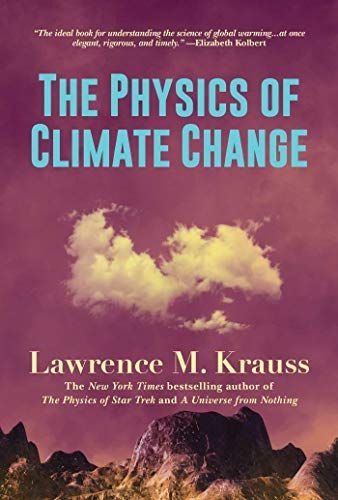
The Physics of Climate Change
The first book to briefly and clearly present the science of climate change in a way that is accessible to laypeople, providing the perspective needed to understand and assess the foundations and predictions of climate change. “Brilliant and fundamental, this is the necessary book about our prime global emergency. Here you’ll find the facts, the processes, the physics of our complex and changing climate, but delivered with eloquence and urgency. Lawrence Krauss writes with a clarity that transcends mere politics. Prose and poetry were never better bedfellows.” —Ian McEwan “A brief, brilliant, and charming summary of what physicists know about climate change and how they learned it.” —Sheldon Glashow, Nobel Laureate in Physics, Metcalf Distinguished Professor Emeritus, Boston University “The distinguished scientist Lawrence Krauss turns his penetrating gaze on the most pressing existential threat facing our world: climate change. It is brimming with information lucidly analysed. Such hope as there is lies in science, and a physicist of Dr. Krauss’s imaginative versatility is unusually qualified to offer it.” —Richard Dawkins, author of The Blind Watchmaker and Science in the Soul “Lucid and gripping, this study of the most severe challenge humans have ever faced leads the reader from the basic physics of climate change to recognition of the damage that humans have already caused and on to the prospects that lie ahead if we do not change course soon.” —Noam Chomsky, Laureate Professor, University of Arizona, author of Internationalism or Extinction? “Lawrence Krauss tells the story of climate change with erudition, urgency, and passion. It is our great good luck that one of our most brilliant scientists is also such a gifted writer. This book will change the way we think about the future.” —Jennifer Finney Boylan, author of Good Boy and She’s Not There “Everything on climate change that I’ve seen is either dumbed down and bossy or written for other climate scientists. I’ve been looking for a book that can let me, a layperson, understand the science. This book does just what I was looking for. It is important.” —Penn Jillette, Magician, author of Presto! and God, No! “The renowned physicist Lawrence Krauss makes the science behind one of the most important issues of our time accessible to all.” —Richard C. J. Somerville, Distinguished Professor Emeritus, Scripps Institution of Oceanography, University of California, San Diego “Lawrence Krauss is a fine physicist, a talented writer, and a scientist deeply engaged with public affairs. His book deserves wide readership. The book’s eloquent exposition of the science and the threats should enlighten all readers and motivate them to an urgent concern about our planet’s future.” —Lord Martin Rees, Astronomer Royal, former president of the Royal Society, author of On the Future: Prospects for Humanity
Reviews
Amira BEN@amirasreading
Highlights
Amira BEN@amirasreading
Page 146
Amira BEN@amirasreading
Page 134
Amira BEN@amirasreading
Page 123
Amira BEN@amirasreading
Page 118
Amira BEN@amirasreading
Page 79
Amira BEN@amirasreading
Page 42
Amira BEN@amirasreading
Page 38
Amira BEN@amirasreading
Page 36
Amira BEN@amirasreading
Page 33
Amira BEN@amirasreading
Page 31
Amira BEN@amirasreading
Page 26
Amira BEN@amirasreading
Page 26
Amira BEN@amirasreading
Page 26
Amira BEN@amirasreading
Page 25
Amira BEN@amirasreading
Page 20
Amira BEN@amirasreading
Page 12
Amira BEN@amirasreading
Page 12
Amira BEN@amirasreading
Page 11
Amira BEN@amirasreading
Page 11
Amira BEN@amirasreading
Page 10